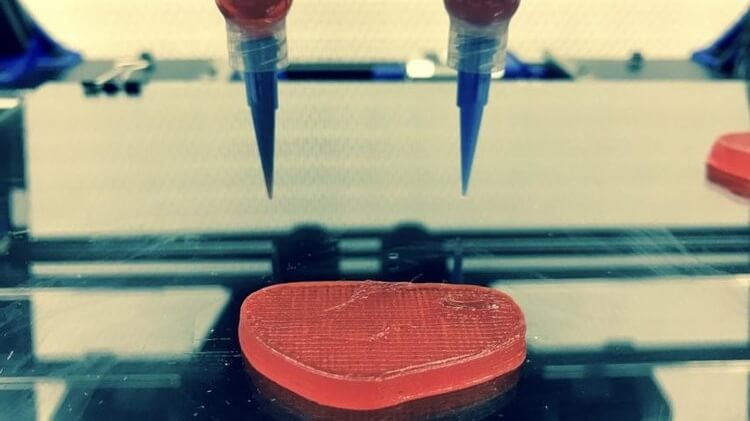(Updated May 26, 2019.) Spanish startup NovaMeat is on a mission to transform the world of protein with its 3D-printed seaweed-based vegan steaks. And its products could be in stores by 2022.
Founded by Italian bioengineer Giuseppe Scionti in 2017, NovaMeat has created a sustainable, nutritious alternative to traditional animal-based meat with the use of tissue engineering and bio-printing. The new plant-based product not only looks like steak, but it also has the same nutritional value and consistency. According to the company, it’s made from peas, rice, and seaweed.
It’s also more environmentally-friendly than its animal-based counterpart; industrial farming of cows is hailed as one of the biggest causes of climate change. Bearing this in mind, Scionti wanted to pick the plant-based ingredients with the lowest impact on the planet.
“I used raw materials that don’t have a negative impact on the environment,” Scionti told Business Insider. “I tried not to choose, for example, avocado or quinoa, as increasing the demand for foods that need to imported would have a detrimental impact on the environment.”

Creating ‘Realistic’ Plant-Based Meat
According to Vegconomist, Scionti launched NovaMeat after he grew frustrated with the lack of authentic texture in many vegan meat products. Even Impossible Foods “bleeding” plant-based Impossible Burger – available in fast-food chains and restaurants across the U.S. – lacks the true texture of meat, according to Scionti. He told Business Insider, “They may taste like meat, but they have the texture of hamburgers.”
The element of taste is something NovaMeat is still working on, however, and Scionti hopes to partner with a chef to get his 3D printed plant-based product tasting just as good as it looks. The startup is also developing vegan chicken breast, which like the steak, is created by combining the vegetable proteins into a paste and then 3D printing them – this method is inexpensive, creating 100 grams of plant-based meat in 30 minutes and costing less than $3.
“I hope to see our technology being used by big food manufacturers to produce plant-based meat alternatives on a widespread basis to hit UK shelves before 2022,” Scionti said recently. “We’ll also partner with innovative restaurants too, to bring plant-based fibrous meat to a widespread audience even faster.”
Scionti and NovaMeat are not alone in their mission to bring sustainable, nutritious, 3D printed plant-based steaks to the consumer market. Jet-Eat, an Israeli-based company, is also working on 3D printing plant-based meat, working with chefs and butchers to make sure its products are as close to traditional meat as possible.
Aleph Farms – another Israeli startup – is also on a mission to create a 3D printed steak, however, unlike NovaMeat, the company’s meat will be lab-grown from animal cells.


